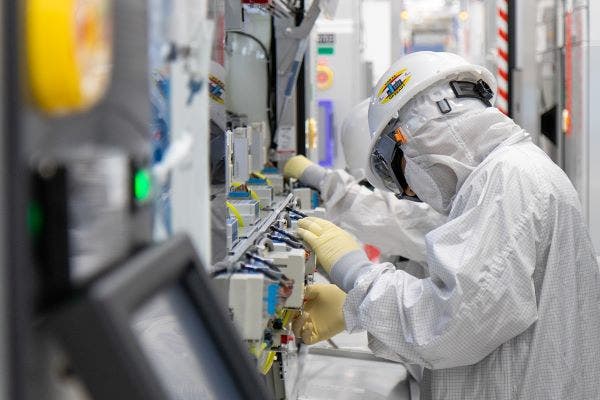Intel Hits Key Chip-Making Milestone In Gelsinger’s Comeback Plan
Intel 4, which began high-volume production on Friday, is the second of five advanced chip manufacturing nodes in CEO Pat Gelsinger’s four-year comeback plan, which seeks to put the semiconductor giant ahead of Asian foundry rivals TSMC and Samsung Electronics in state-of-the-art capabilities by 2025.

An Intel employee working in the cleanroom of Fab 34, the tech giant’s new chip fabrication plant in Ireland.
Intel has begun high-volume production of advanced chips debuting at the end of the year, a key milestone in CEO Pat Gelsinger’s ambitious manufacturing comeback plan.
The Santa Clara, Calif.-based semiconductor giant on Friday celebrated the opening of a new chip fabrication plant in Ireland called Fab 34, which is using extreme ultraviolet technology for its Intel 4 manufacturing process. Also known as EUV, the technology is seen by Intel and other major chipmakers like TSMC as a critical building block for manufacturing advanced chips.
[Related: AMD Hires Intel Exec Who Led Client AI Team For ‘Meteor Lake’ CPUs]
The new fab along with a planned wafer fabrication plant in Germany and a planned assembly and test facility in Poland “will help create a first-of-its-kind, end-to-end semiconductor manufacturing value chain in Europe,” according to the company.
“I am proud of the Intel team as well as our customers, suppliers and partners who worked with us to bring this moment to life and keep us on the path back to process leadership,” Gelsinger said in a statement.
Why Intel 4 Is A Big Deal For The Chipmaker
Intel 4 was previously known as the chipmaker’s 7-nanometer process, which faced a significant delay in 2020 under the leadership of former CEO Bob Swan when it identified manufacturing defects.
At that point, the company’s advanced chip-making capabilities had already fallen behind Asian contract chip manufacturers TSMC and Samsung Electronics—which produce chips for significant Intel rivals such as AMD and Nvidia—due to a multi-year delay of its 10nm process.
When Gelsinger became CEO of Intel in early 2021, he called for the company to double down on manufacturing and restart an effort to manufacture chips for other companies while also increasing the amount of chip designs manufactured by foundries such as TSMC.
The idea was to rebuild Intel’s chip-making prowess while relying on whichever process it needed, whether manufactured by Intel or another company, to provide competitive processors along the way.
Vowing to restore Intel’s leadership in advanced chip manufacturing, Gelsinger announced a plan in July 2021 to accelerate the company’s process node road map to catch up with TSMC and Samsung and then surpass them in state-of-the-art chip production by 2025.
As outlined in 2021, Gelsinger’s comeback plan called for Intel to begin production on five advanced process nodes in four years: Intel 7 in 2021, Intel 4 in 2023, Intel 3 in 2023, Intel 20A in 2024 and Intel 18A in 2025, according to the timeline given at the time.
What Intel 4 Will Be Used For, And What’s Next
Intel 4, which began high-volume production on Friday, is the second of the five nodes in Gelsinger’s comeback plan. The company will use the node to manufacture the compute tile of the Core Ultra “Meteor Lake” processors for laptops launching in December.
“This is a landmark for Intel and the semiconductor industry as a whole,” said Ann Kelleher, executive vice president and general manager of technology development at Intel, in a statement.
“The transfer of Intel 4 process technology into high-volume production in Ireland is a giant step toward enabling leading-edge manufacturing in Europe and a huge moment for our technology development teams in Oregon, too,” she added.
At the Intel Innovation event last month, Gelsinger said Intel 3 is on track to enter manufacturing at the end of the year. Intel has previously said it will use Intel 3 for the “Granite Rapids” and “Sierra Forest” generations of Xeon server processors arriving in 2024.
The company has also affirmed that Intel 20A and Intel 18A are on track for manufacturing in 2024 after previously announcing that Intel 18A would arrive sooner than the original 2025 timeline.